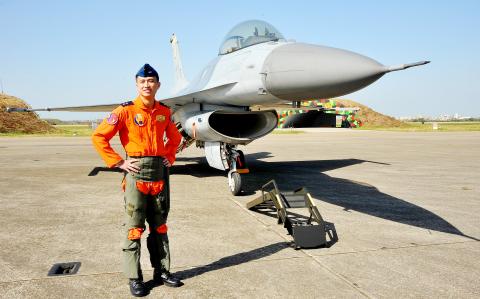US-based media reported on Thursday that the US government had privately decided to sell a new arms package to Taiwan, but was keeping it under wraps until after an official delegation by Chinese President Hu Jintao (胡錦濤) visits next week.
Quoting unnamed senior US government officials, the Washington Times said the package would include new upgrades for Taiwan’s aging arsenal of US-made F-16A/Bs and it is expected to trigger fresh outrage from Beijing.
In Taiwan, the Ministry of National Defense and the Air Force would neither confirm nor deny the information, with officials saying they had yet to learn of the content of the reports.

PHOTO: LIU HSIN-DE, TAIPEI TIMES
In recent years, Taiwan has made repeated requests for purchases of F-16C/D aircraft from the US, saying the fighters were necessary to ensure balance in the Taiwan Strait following reports of China’s development and testing of fourth and fifth-generation fighter aircraft, including the Chengdu J-20 stealth fighter.
The prototype plane — China’s first radar-eluding stealth fighter, seen as match for the US’ F-22 — reportedly made its first test flight on Wednesday. Experts said that when operational, the fighter would likely overwhelm Taiwanese defense capabilities.
The Washington Times reported that while Taiwan’s request for F-16C/Ds was still being considered, the upgrade package, which would provide the existing fleet with new electronics, engines and missiles, had already been secured.
Other elements of the arms package could include new radar, possibly the advanced Active Electronically Scanned Array system and AIM-9X air-to-air missiles, the report said.
Time is running short for the new F-16 request. US lawmakers who support their inclusion have said that F-16 production lines are expected to close soon, possibly later this year, and are unlikely to be reopened.
The news comes at a sensitive time for US-China relations, with Hu expected to meet US President Barack Obama at the White House on Wednesday. Beijing cut military exchanges after a previous arms deal last year and imposed sanctions on US firms involved in the deal.
One of the aims of US Secretary of Defense Robert Gates’ three-day visit to Beijing earlier this week was to reactivate military exchanges between the US and China.
At a joint press conference on Monday, Chinese Defense Minister Liang Guanglie (梁光烈) said the US should halt future arms sales to Taiwan, as they “jeopardized China’s core interests.”
Reports said Gates later told reporters he did not believe the US’ arms sales policy toward Taiwan would change anytime soon.
Chinese Nationalist Party (KMT) Legislator Lin Yu-fang (林郁方), a member of the legislature’s Foreign and National Defense Committee, said that based on recent meetings with US government officials, the upgrade package for the F-16s could materialize “soon,” adding that the deal was likelier to materialize than the sale of new F-16C/Ds.
Under the US’ Taiwan Relations Act, the US is obliged to provide Taiwan with defensive weapons, although sales of major hardware, including fighter aircraft, have become less frequent in recent years.
Most of Taiwan’s arsenal of Air Force fighters other than the F-16A/Bs could be retired by 2025, with F-5E/Fs scheduled to be decommissioned between 2014 and 2017.

PREPAREDNESS: Given the difficulty of importing ammunition during wartime, the Ministry of National Defense said it would prioritize ‘coproduction’ partnerships A newly formed unit of the Marine Corps tasked with land-based security operations has recently replaced its aging, domestically produced rifles with more advanced, US-made M4A1 rifles, a source said yesterday. The unnamed source familiar with the matter said the First Security Battalion of the Marine Corps’ Air Defense and Base Guard Group has replaced its older T65K2 rifles, which have been in service since the late 1980s, with the newly received M4A1s. The source did not say exactly when the upgrade took place or how many M4A1s were issued to the battalion. The confirmation came after Chinese-language media reported

The Taiwanese passport ranked 33rd in a global listing of passports by convenience this month, rising three places from last month’s ranking, but matching its position in January last year. The Henley Passport Index, an international ranking of passports by the number of designations its holder can travel to without a visa, showed that the Taiwan passport enables holders to travel to 139 countries and territories without a visa. Singapore’s passport was ranked the most powerful with visa-free access to 192 destinations out of 227, according to the index published on Tuesday by UK-based migration investment consultancy firm Henley and Partners. Japan’s and

A Ministry of Foreign Affairs official yesterday said that a delegation that visited China for an APEC meeting did not receive any kind of treatment that downgraded Taiwan’s sovereignty. Department of International Organizations Director-General Jonathan Sun (孫儉元) said that he and a group of ministry officials visited Shenzhen, China, to attend the APEC Informal Senior Officials’ Meeting last month. The trip went “smoothly and safely” for all Taiwanese delegates, as the Chinese side arranged the trip in accordance with long-standing practices, Sun said at the ministry’s weekly briefing. The Taiwanese group did not encounter any political suppression, he said. Sun made the remarks when

BROAD AGREEMENT: The two are nearing a trade deal to reduce Taiwan’s tariff to 15% and a commitment for TSMC to build five more fabs, a ‘New York Times’ report said Taiwan and the US have reached a broad consensus on a trade deal, the Executive Yuan’s Office of Trade Negotiations said yesterday, after a report said that Washington is set to reduce Taiwan’s tariff rate to 15 percent. The New York Times on Monday reported that the two nations are nearing a trade deal to reduce Taiwan’s tariff rate to 15 percent and commit Taiwan Semiconductor Manufacturing Co (TSMC, 台積電) to building at least five more facilities in the US. “The agreement, which has been under negotiation for months, is being legally scrubbed and could be announced this month,” the paper said,